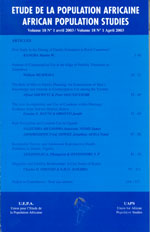
|
African Population Studies
Union for African Population Studies
ISSN: 0850-5780
Vol. 29, No. 2, 2016, pp. 1851-1874
|
 Bioline Code: ep15026
Bioline Code: ep15026
Full paper language: English
Document type: Research Article
Document available free of charge
|
|
|
African Population Studies, Vol. 29, No. 2, 2016, pp. 1851-1874
| fr |
Contraceptive Use and Its Socio-economic Determinants among Women in North-East and North-West Regions of Nigeria: A Comparative Analysis
Unumeri, Godwin; Ishaku, Salisu; Ahonsi, Babatunde & Oginni, Ayodeji
Résumé
Cette étude examine les facteurs socio-économiques associés avec l’usage des contraceptifss parmi les femmes en âge de procréer dans le Nord du Nigéria. La
régression bivariée et logistique a été appliquée sur les données démographiques de santé receuillies au Nigeria entre: 1999-2013. avec le but d’établirla relation entre a
l’usage des contraceptifs modernes (la variable dépendante) et une gamme de facteurs socio-économiques (âge, le lieu de résidence rurale-urbaine, éducation, religion, l’emploi,, l'état matrimonial et le nombre d'enfants vivants) dans le Nord-Est (NE) et Nord-Ouest (NO) du Nigeria.. Les résultats ont démontré une association positive entre l’émancipation socio-économique des femmes et l’usage r des contraceptifs modernes dans NO en 1999 (AOR = 2.15 ; 95%CI=1.47, 3.14), 2003 (AOR = 1,64 ; 95%CI=1.30, 2,08) puis 2013 (AOR = 1,30 ; 95%CI=1.12, 1.50), mais seulement en 2008 (AOR = 0,74 ; 95%CI=0.64, 0,86) dans le NE. L’utilisation des contraceptifs modernes pourrait augmenter dans le Nord du Nigéria si les projects
de plannification familiale améliorent l’etat socio-economique de la femme.
Mots Clés
Contraception; déterminants socio-économiques; nord du Nigeria
|
| |
| en |
Contraceptive Use and Its Socio-economic Determinants among Women in North-East and North-West Regions of Nigeria: A Comparative Analysis
Unumeri, Godwin; Ishaku, Salisu; Ahonsi, Babatunde & Oginni, Ayodeji
Abstract
This study investigated the socio-economic factors associated with reported contraceptive use by women of reproductive age in northern Nigeria. Bivariate and logistic regression analysis was applied to successive Nigeria Demographic and Health Survey (NDHS: 1999-2013) data to examine the relationship between reported use of modern contraceptives (the dependent variable) and the socio-economic status (age, rural-urban residence, education, religion, current work status, marital status, and number of living children) of these women in the north-east (NE) and north-west (NW) geo-political zones (GPZs). The results indicated that women’s socio-economic status were positively associated with use of modern contraceptives in the NW in
1999 (AOR=2.15; 95%CI=1.47, 3.14), 2003 (AOR=1.64; 95%CI=1.30, 2.08) and 2013 (AOR=1.30; 95%CI=1.12, 1.50) and also in the north-east in 2008 (AOR=0.74; 95%CI=0.64, 0.86). Contraceptive use could increase as FP programmes better respond to the socio-economic and cultural circumstances of women in northern Nigeria.
Keywords
Contraceptive use; Socio-economic determinants; Northern Nigeria
|
| |
© Copyright 2015 - African Population Studies
Alternative site location: http://www.uaps-uepa.org
|
|
